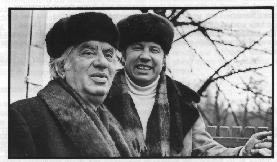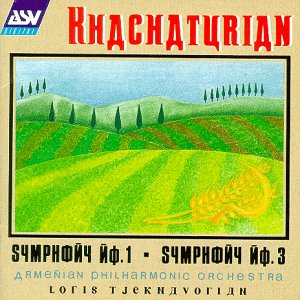|
Aram
Khachaturian
By Olga
Fyodorova
The year
1924. The basement of the Moscow Wine Bottling Factory. There is a young
man with jet-black hair sitting in the corner with blood dripping from
his hand… He is approached by a store woman.
“What’s up?”
“Cut my hand
on broken glass… Lost a lot of blood. Thank God I managed to stop the
blood but it hurts like hell! Moreover, this may cost me my profession!”
“Don’t you
worry, everything will be all right! You’ll be back to work before you
know it!”
“You think
moving boxes is all I’m doing? No way, it’s just hackwork. I’m a
musician, got it? Studying cello at the Gnessins Music College!”
“Oh, really?
How long?”
“Hard to say,
really… Started figuring out tunes on the piano when I was a kid. We
had an old upright piano in Tbilisi, which is my hometown even though
I’m an Armenian. In Moscow I came to the music college only to hear them
tell me I was too old to be a good pianist and why don’t I enter the
cello class they had just opened there… That’s exactly what I did. It
was two years ago… My teachers say I’m doing fine, but I don’t think so,
really… Well, maybe someday I move into conducting… or composing, who
knows?…”
“Composing?
Are you telling me you are writing music too?”
“Yeah, there
is always music playing inside my head, but the problem is I can’t
properly put it down on paper… I will learn, of course, as soon as my
hand gets better. Even now, as I’m sitting here talking to you, it seems
like someone is singing a marching song right inside my head. It’s like
a hurricane and I can hear its sounds reverberating from the surrounding
mountains…”
Aram
Khachaturian, for that was the name of the young loader, successfully
finished the music college, then the Moscow Conservatory and eventually
became a composer. Still in Conservatory, he wrote several pieces, which
were quickly picked up by many leading musicians here.
Feeling
lonely and homesick in Moscow, Aram chased away the blues by going to
theater, concerts and mingling with interesting people. The talented
young man quickly made himself comfortable in the city’s elitist music
community much with the help of his brother who was a prominent stage
figure back in those days. Before long he was rubbing shoulders with
leading writers, painters, actors and musicians, among them the young
but already famous violinist David Oistrakh. It was precisely with
Oistrakh’s inimitable playing in mind that Khachaturian wrote his Violin
Concerto, so brimful with the rich and fragrant melodies of his native
Armenia…
The Concerto
premiered with resounding success in 1940 and the following year
Khachaturian followed up his success writing music for Mikhail
Lermontov’s drama “Masquerade.” Staged at one of Moscow premier theaters,
the music fitted the production just perfectly underscoring Lermontov’s
timeless verse...
The waltz
from “Masquerade” became one of the best-loved and signature pieces ever
written by Aram Khachaturian.
“Masquerade”
premiered right before the June 22, 1941 Nazi invasion…
As the war
wore on, Khachaturian was active first holding concerts for the
conscripts and then setting up mobile frontline orchestras he sometimes
joined in. He also played his music on the radio and kept writing on…
His new
ballet “Gayane” premiered in the Urals in 1942 at the very height of the
war, performed by members of Leningrad’s Kirov Opera and Ballet, now
Mariinsky Theater.
Khachaturian’s new ballet created a profound impression, its stirringly
optimistic music offering much-needed inspiration for the Soviet
soldiers preparing to engage the enemy and those recuperating from their
wounds in the quiet of the Ural Mountains. The “Dance With Swords” made
Khachaturian famous all around the world and wherever he went people
invariably asked him to play this fiery tune…
In the Soviet
Union popularity did not necessarily mean a peaceful life though, and in
1948 dark clouds started gathering over Khachaturian and several other
leading composers. A government decree initiated by Josef Stalin lashed
out angrily against their work dismissing it as formalist and alien to
the working class.
The whole
country joined in the witch-hunt. The great composers had their music
banned and all their foreign tours canceled…
The crackdown
left an indelible and very painful imprint on Khachaturian’s mind and
even after the disgraced composers were reinstated a couple of years
later, he was never the same again... He no longer enjoyed writing
music and his “Spartacus” ballet about the life, struggle and love of
the gladiator who dared to question the indestructible might of the
Roman Empire was the only thing that equaled the emotionally
supercharged music he wrote before the crackdown came…
“Spartacus”
was staged by the country’s leading theaters and awarded the
much-coveted Lenin Prize.
During his
ebbing years Aram Khachaturian was getting increasingly interested in
conducting, touring the world and meeting with leading musicians.
Charming and friendly, he immediately endeared himself to all making new
friends and expanding his fan base.
But never,
even once, did he betray his old friends, and his marriage to fellow
composer Nina Makarova was an excellent example for so many families to
follow…
Boasting many
students and followers, Aram Khachaturian spent 27 years teaching at the
Moscow Conservatory bringing up a whole constellation of top-notch
composers.
Many would-be
composers, especially those willing to create classical European music
while preserving each one’s national traditions, dreamed of studying
with Khachaturian. Small wonder too since it was exactly what the great
Armenian composer did all his life…
A living
legend, Aram Khachaturian did not live to mark his 75th birthday and was
buried with great honors in the Armenian capital Yerevan.
|

